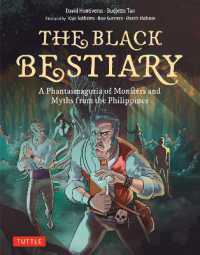Full Description
The book presents aspects of cross-currents of theorizing of self, culture and society in the contemporary Taiwan. Social theorizing has been addressed critically, reflectively and creatively by the philosophical, religious, psychological and literary traditions of one of the world's great civilizations
Theorizing is a dynamic movement of self, culture, society and the world as it is related to our actions, reflections, meditations to understand the world more meaningfully and holistically as well as to transform it. But much of social theorizing in the modern world is primarily Euro-American and despite the socalled globalization of knowledge, this condition of one-sided Euro-American valorization of knowledge and neglect of others continues unabated. There is very little attention to theorizing about the human condition emerging from other parts of the world such as Taiwan and its global implication. This book transforms this condition by mapping the fieldof theorizing in a wider spectrum of philosophy, psychology, religions, social sciences and humanities in contemporary Taiwan.
Contents
Cross-Currents of Social Theorizing of Contemporary Taiwan: An Introduction and an Invitation.- Part I. Cross-Currents of Social Theorizing of Contemporary Taiwan: Classical Roots and Contemporary Reconstructions.- Chapter 1. A Scientific Interpretation of Confucian Theorizing on Self-cultivation.- Chapter 2. From Self to Self Nature: Buddhist Self-Enlightenment Theory.- Chapter 3. Wisdom Consultation: Application of Yang-ming's Nousology in Indigenous Psychological Consultation.- Chapter 4. Constructing the Theoretical Basis of Chinese Indigenous Social Science.- Part II. Social Theorizing in Contemporary Taiwan: Glimpses from Some Contemporary Movements and Socio-Cultural Initiatives.- Chapter 5. The Social Transformation from Labor Movement to Political Movement - The Praxis of Committee for Action of Labor Legislation and People's Democratic Political Movement.- Chapter 6. Another World is Possible: Abandoning the Hegemony of Global Capitalism in The Sunflower Movement in Taiwan.- Chapter 7. Culture, Land Reclamation Movement and Property Relations: Reflections on the Language of Property in Indigenous Mapping Projects in Truku Society, Taiwan.- Chapter 8. Countering Prejudices with Uncanny Strangeness: Taiwanese Children's Books about Southeast Asian Marriage Immigrants in Taiwan.- Chapter 9. Gastronomic Fusion and Flexible Culinary Citizenship of Southeast Asian Female Migrants in Taiwan's Public TV Programs.- Part Three: Ethics and Other Issues of Cultural Creativity.- Chapter 10: An Inclusive Theory of Ethics Based on Chinese Culture: The Duality Model of Professional Ethics for Helpers.- Chapter 11. Through the Compound Eyes The Ethical Dynamics of Wu Ming-yi's Materialistic Literary Vision in The Man with the Compound Eyes and The Stolen Bicycle.- Chapter 12. Affect and the Virtual: A Deleuzian Reading of a Taiwanese Film: Kano.- Chapter 13: Articulating Ecological Ethics and Politics of Life in Ming-Yi Wu's The Land of Little Rain.- Chapter 14. Breathing Between: Making a Sensory Ethnographic Film on Freediving Spearfishing with the 'Amis in Taiwan'.- Chapter 15. The Life Education of the Protect Life Relief Pictures in the Buddha Museum, Taiwan..- Chapter 16 The Combat and Compromise in Taiwanese Puppets as a Body without Organ: Samadhi Tang Creative Puppet Troupe as an Example.- Chapter Seventeen: Engaged Buddhism, The Six Pāramitās and Yuanmen's Collective Social-Charity Practices.








